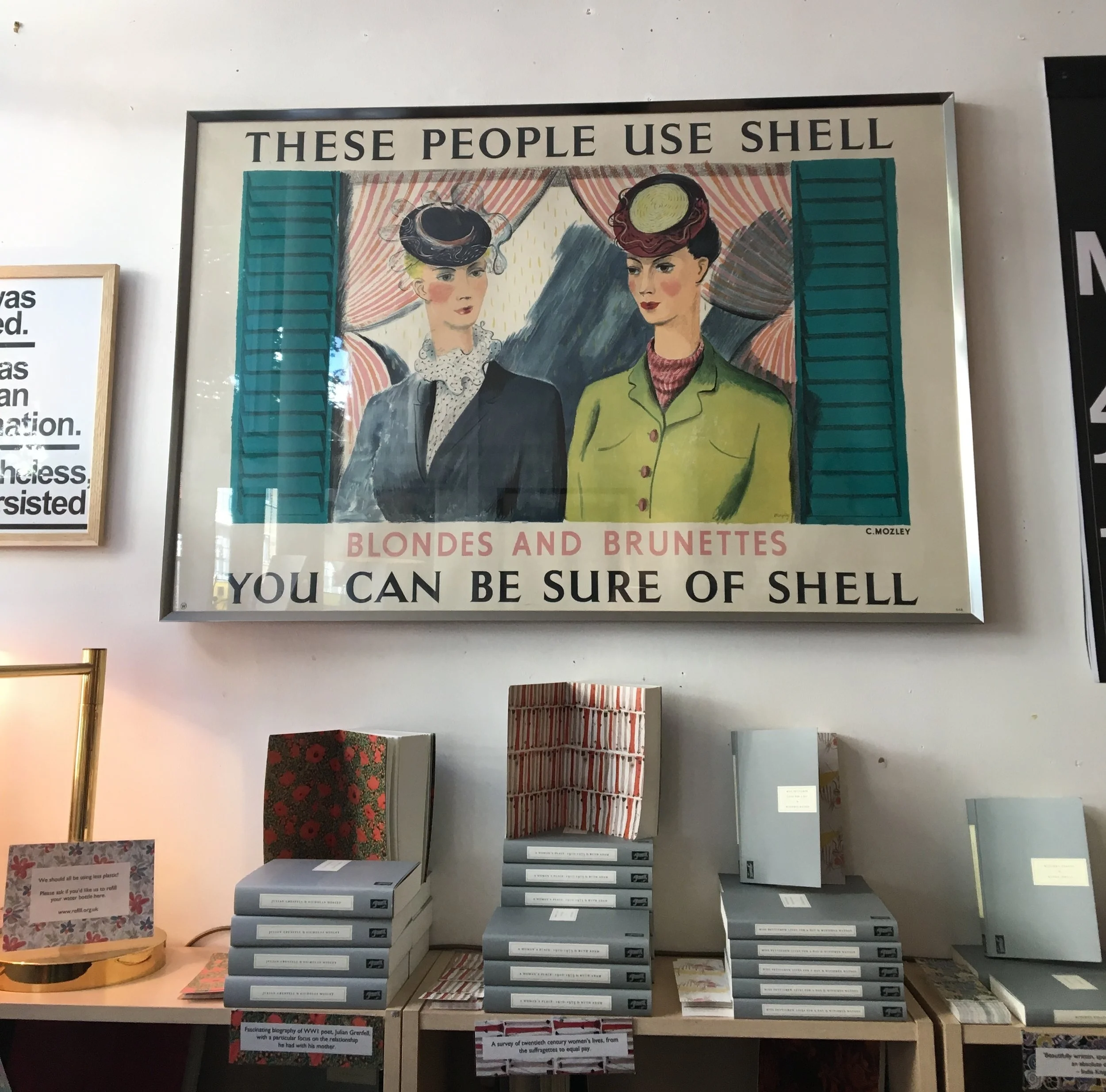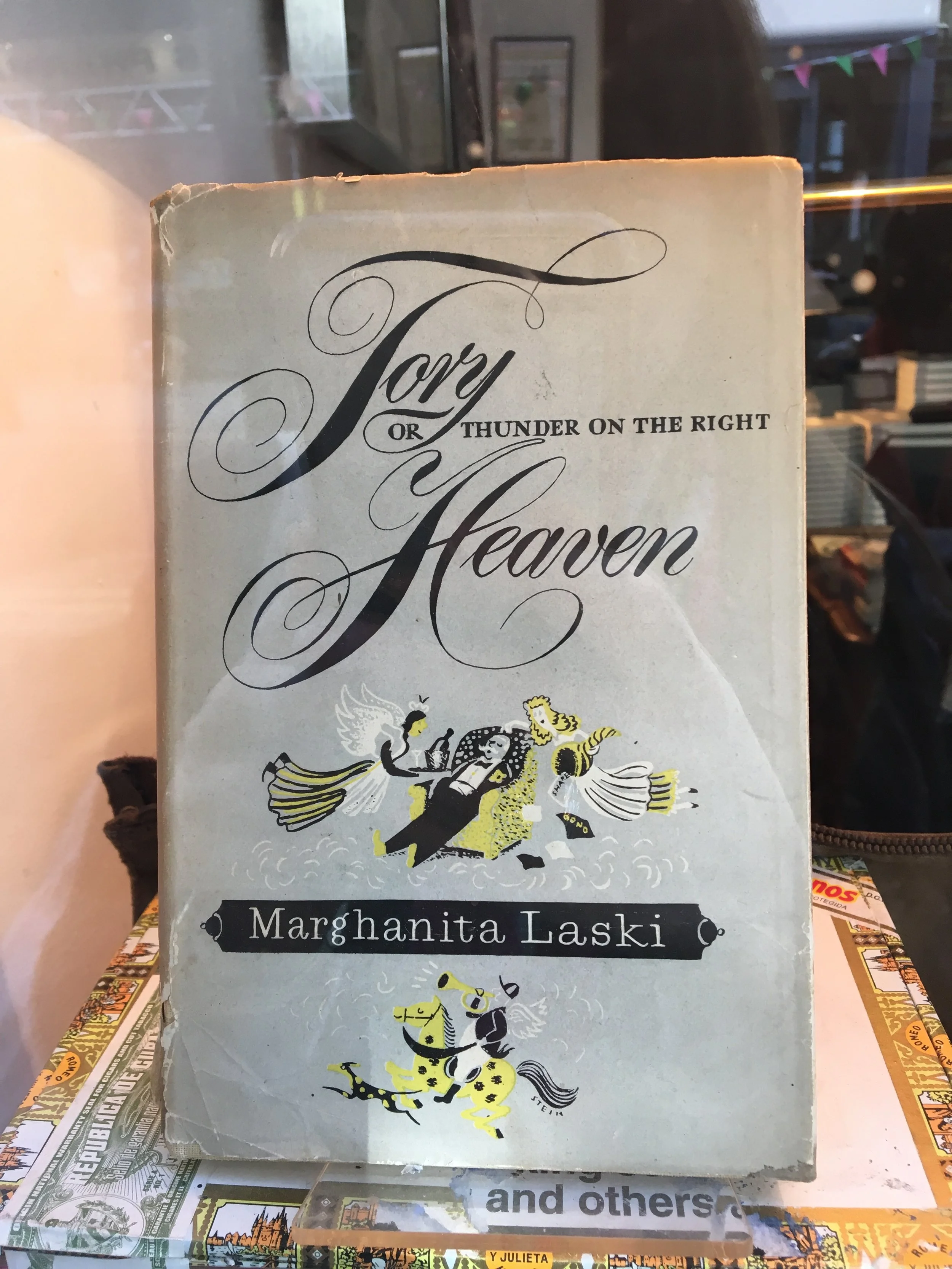Unconventional Mentor no. 8 - Nicola Beauman
"I get bored very easily! When I read I need an interest, a theme, an intensity. Our books aren't for everyone. You either like them or you don't. But I can live with that."
Persephone Books, Lamb’s conduit Street, London.
The Persephone Books shop in Lambs Conduit Street is one of my favourite places in the world. The grey shop front always has window displays that take you back to the 1930s and 40s and hint at what might be inside, where you will find hydrangeas, bentwood chairs, worn textiles and hundreds of books all with the same distinctive grey cover.
Each book is made with so much thought. The covers might be the same, but the end papers are taken from beautiful fabrics that were made in the year that the book was published. There is also a bookmark that comes with each book that includes a snippet of what is inside to entice you to start reading it immediately.
Inside Persephone Books, Lamb’s Conduit Street.
This wonderful place on Lamb’s Conduit Street in London is the creation of Nicola Beauman who founded Persephone books in 1998. The idea behind Persephone Books was to publish lost or out of print books and they are mostly from the interwar years and they are mostly by women. The books are all grey “because – well – we really like grey.”
“We also had a vision of a woman who comes home tired from work, and there is a book waiting for her, and it doesn't matter what it looks like because she knows she will enjoy it.”
This is very much a personal vision of Nicola Beauman and she chooses the books that she would like to read, rather than trying to keep up with the current trends. I think this is what readers like about the books. Nicola has worked as a journalist, fiction review and in publishing, and she is also an author in her own right. In 1983 she wrote A Very Great Profession, which looks at the lives of middleclass English women in the interwar years through the writing of the authors of the time. The book was republished by Persephone books 25 years later.
On their website, Nicola’s likes include “brogues, daffodils, mattress ticking and madeira” which are all delightful things. Persephone books creates that nostalgic feel that things were better in the past, that it was a simpler time when the aesthetic of things, fabrics, posters, adverts were all much more pleasing. We all know that this nostalgia isn’t real. The books themselves don’t shy away from the realities of war, death and destruction, but it is packaged up in such a way that we can escape from the harsh news of today with one of these lovely books.
A window display at Persephone Books
I love that most of these books are written by or about women. There is something different about reading a book from a woman’s perspective, particularly during the interwar years. It was a time when women’s roles in the world were changing significantly, following the beginnings of rights to vote in 1918 and the impact of both wars on the work that women were able to do. The books also cover the domestic, which is not something that we often get to hear about. The history books often document big events out in the world, but the lives of people, particularly women, are lived in the home and these experiences are just as important to hear about. The books are somewhat limited in the types of women that feature, they are mostly middle-class stories, although there are authors whose lives were disrupted by the second world war including Etty Hillesum wrote An Interrupted Life and died in Auschwitz in 1943. I would be interested to know if there are lesser known authors from working class backgrounds and to hear about the experiences of people of colour in the interwar years in Britain.
If you can’t get to the shop in London, you can experience something of the charm of Persephone Books on their website. The Persephone Post is a daily snippet of pictures and articles that readers might be interested in. In the last few weeks they have featured textiles by Annie Albers, which were used in a book, as there is an exhibition of her work at the Tate Modern at the moment.
The Persephone Forum is where readers write about the books, so if you can’t decide which one you want to buy (which is a very tricky thing to do) you can see what other people thing of the books to help you to make your choice. Once a month you can hear from Nicola directly by reading The Persephone Letter.
2019 marks 20 years since the first Persephone book was published and in the Biannually they have announced that they are planning some changes. I hope that whatever they plan only brings this wonderful place to a wider audience of people.
Mentor advice: Do the work that you believe needs to be done.
The advice I take from Nicola Beauman is to do the work that you believe needs to be done. When she first started Persephone books, Nicola thought it would just be a mail order business and the first book she published didn’t sell out of the 5000 copies she bought. Rather than let that put her off, she continued to publish books that she loved and believed needed to be brought back in to print and over time this approach paid off. The success of Miss Pettigrew Lives For A Day was a turning point for the business and today Persephone Books has fans all over the world. 25,000 people get the Persephone Biannually which is the loveliest bit of post you can get. This month’s issue includes details of the new books being published this Autumn, The Call by Edith Ayrton Zangwill about a scientist who leaves her job to become a suffragette sounds brilliant and has gone on to my wish list. There is also reviews, news and extracts from things written by Persephone writers.
It is clear from every aspect of Persephone Books that Nicola has a passion for bringing these lost stories back to life and in such a distinctive way. For me this is a reminder to find the passion in my work and to find my own way to do things, and then keep working at it.
You can find out more about Persephone Books here and Nicola Beauman here


